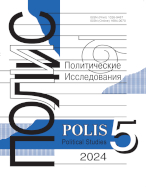Concept of Tolerance in the Ideological Confrontation of European Think Tanks
Medushevsky N.A.,
Cand. Sci. (Pol. Sci.), Associate Professor, UNESCO Department of Peace Culture and Democracy, Faculty of History, Political Science and Law, Russian State University for the Humanities, lucky5659@yandex.ru
DOI: 10.17976/jpps/2015.05.09
Medushevsky N.A. Concept of Tolerance in the Ideological Confrontation of European Think Tanks. – Polis. Political Studies. 2015. No. 5. https://doi.org/10.17976/jpps/2015.05.09
Nowadays tolerance has become one of the basic elements of European integration process and is often represented by politicians as a form of liberal ideology, which is based on the principles of citizens equality and opponent respect. At the same time common understanding of the tolerance in political science has not yet settled, and many attempts to legally formalize the principles of tolerant behavior, making them mandatory, constantly cause many protests. The main conflict on this issue formed in the political expertise sphere and is represented by the set of analytical centers with liberal and conservative orientation. Most of liberal think tanks take a proactive stance, trying to regularize the sphere of EU citizens tolerant interaction through the adoption of new laws prohibiting all forms of possible discrimination. Conservative think tanks, on the contrary, appeal to the classic social values, including family, religion, language, culture. Identification of the “right” approach to the tolerance interpretation became the priority for the development of the whole European integration policy, but at the same time, the constant appeal to society’s values leads to the devaluation of these values and the loss of European society compromise culture. In recent years the opposition of conservative and liberal approaches led to the crisis of the European tolerance concept which under the influence of several private positions lost its original content given by UNESCO Tolerance Declaration. Under the influence of real policy, today even more often instead of social cohesion, tolerance begins to symbolize the utopia of the harmonious existence and the illusory nature of the human rights and freedoms categories.
See also:
Kartzov A.S.,
Human rights and tolerance. – Polis. Political Studies. 2010. No6
Suvakovic U.,
Political parties as traditional mechanisms of representation in modern societies. – Polis. Political Studies. 2010. No2
Arbatova N.K.,
Climate threats – a new dimension of EU security. – Polis. Political Studies. 2022. No6
Lutsenko S.I.,
Pluralism, Tolerance and Freedom in Decisions of the European Court of Human Rights. – Polis. Political Studies. 2015. No2
Sungurov A.Yu., Raspopov N.P., Belyayev A.Yu.,
Mediatory institutions and their development in contemporary Russia. Part II. Think tanks and public policy centers. – Polis. Political Studies. 2012. No4





.jpg)






 print
print
.jpg)
.jpg)